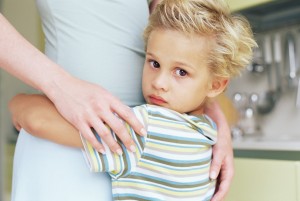Authored by Pat Holmes, Family & Consumer Sciences Educator, Ohio State University Extension Educator
Causes of stress for children come from both positive and negative experiences in their lives such as starting school or day care, a birthday party, birth of a new sibling, camping out for the first time, separation/divorce of a parent, change of parent’s employment, moving to a new location, a sleep-over, homelessness, family illness, or the death of a family member.
The excitement or anxiety a child experiences places extra demands on their ability to cope. Children cope best when the existence of stress is recognized and adults ensure the child’s basic physical needs are met.
Parents are the child’s role model for how to deal with stress. You may not realize that children are watching and learning from you, but they are. Show them by your example how to cope with expected and unexpected changes in a positive way.
If you are the parent of more than one child you probably recognize that no two children experience change in exactly the same way. When children have a positive relationship with both parents, or at least one significant adult, they are better able to cope with stress in their life.
How can parents help? As a parent you should look for emotional, social, physical, and cognitive behaviors that are not the norm for your child. You may recognize anything from ‘acting out’ behaviors to becoming the ‘perfect’ child. The second is harder to recognize, but if it is a change from the way they have always behaved, they may be trying to be perfect so nothing else will change. Being perfect puts a huge strain on the child and they may need counseling help to get over this response to stress.
Here are a few suggestions:
• Set realistic expectations according to your child’s developmental level.
• Provide encouragement. Say “I love you” and let them know you are there for them.
• Verbally recognize positive behavior. When unacceptable behavior occurs, redirect your child by stating their options. Help your child find acceptable ways to express negative feelings.
• Reduce family conflict.
• Give your child a chance to make choices when appropriate.
• Listen to what your child is saying. Notice their body language. Take time to talk with your child.
• Spend time together and interact with your child.
• Allow your child to help you when appropriate, but be prepared for the task to take longer.
• Discipline with logical consequences. Limit “time out.” Above all be consistent.
• If your child is having difficulty adjusting, limit additional life changes when possible. Example: if parents are separating/divorcing that is not the time to begin toilet training for a toddler.
• Remember the value of laughter.
• Seek professional help for your child and/or yourself when needed.
Source:
Breslin, D. (2005). Children’s capacity to develop resilien¬cy: How to nurture it. Young Children, 60 (1), 47–52.
Farish, J. M. (2003). Helping young children cope: When disaster strikes. Washington, DC: The National Associa¬tion for the Education of Young Children.
Frost, J. (2005). Lessons from disasters. Childhood Educa¬tion, 82 (1), 2–8.
Mercurio, M. L., & McNamee, A. (2006). Using children’s literature to cope with the loss of a pet. Childhood Edu¬cation, 82 (3), 153–160.
Rycik, M. T. (2006). Using books to help children un¬derstand troubled times. Childhood Education, 82 (3), 145–152.
http://ohioline.osu.edu/hyg-fact/5000/pdf/Helping_Children_Stress.pdf
